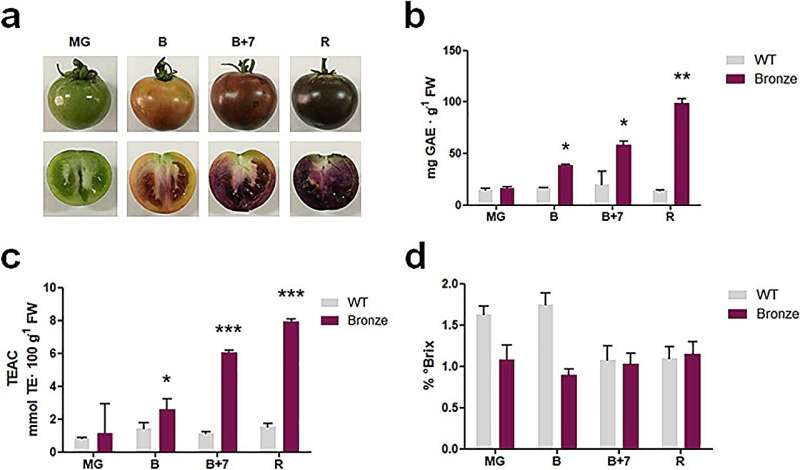This article has been reviewed according to Science X's editorial process and policies. Editors have highlighted the following attributes while ensuring the content's credibility:
fact-checked
peer-reviewed publication
proofread
Accessing the bronze tomato's enhanced antioxidant and health properties through metabolic engineering

The Bronze tomato, a product of metabolic engineering, produces high levels of polyphenol due to the over-expression of genes such as VvStSy, AmDel/Rosea1, and AtMYB12. This modification, part of broader efforts to enhance plant nutritional value through specific biochemical alterations, results in ripe fruits with significantly higher antioxidant and anti-inflammatory properties.
However, while these tomatoes show increased flavonols, anthocyanins, and stilbenes, the overall impact on other physiological processes and the total nutritional profile requires further exploration.
Horticulture Research published research titled "Engineering the polyphenolic biosynthetic pathway stimulates metabolic and molecular changes during fruit ripening in 'Bronze' tomato."
In this study, researchers analyzed the transcriptional and metabolic profiles of the Bronze tomato line at various ripening stages to understand how regulatory and structural transgenes affect primary and secondary metabolisms.
Researchers initially measured the total content of polyphenols, antioxidant capacity, and soluble solutes from fruit harvested at four different ripening stages. Bronze fruit showed significantly higher polyphenol content and antioxidant capacity compared to the control, with a distinct increase from the breaker stage onward. However, soluble solutes, defined by the Brix degrees, were slightly reduced in the mature green and breaker stages of the Bronze tomatoes compared to the WT.
Then, they measured the level of the monosaccharides glucose and fructose and two organic acids, malic and citric, deriving from the tricarboxylic cycle. The levels of glucose and fructose in Bronze fruit were always lower compared to WT. Malic acid is significantly lower at the MG and R stages when compared to WT.
Conversely, the level of citric acid was significantly higher in the Bronze tomato. The expression profiles of genes related to energy metabolism were further determined. SUS1 (Sucrose synthase 1) and G6PDH (glucose-6-phosphate dehydrogenase) was repressed at the MG stage, DAHPS (3-deoxy-d-arabino-heptulosonate 7-phosphate synthase) was highly repressed while SK (shikimate synthase) was up-regulated in Bronze fruit compared to WT fruit at the same ripening stages.
The study also explored the Bronze tomato's polyphenol content, revealing significant increases in specific flavonoids and the presence of stilbenes and anthocyanins only in the Bronze line. Most structural genes encoding the enzymes driving the biosynthetic flux towards flavonoids and anthocyanins were significantly up-regulated, particularly from the breaker stage.
Additionally, the investigation into the expression of genes involved in anthocyanin transport and sequestration showed significant increases, suggesting enhanced vacuolar transport and cytoplasmic pH homeostasis. Carotenoid content analysis revealed a distinct shift in the lycopene/β-carotene ratio in the Bronze tomato, with a significant increase in β-carotene at later ripening stages.
This change was linked to the down-regulation of key carotenoid biosynthetic genes, suggesting a complex interplay between carotenoid and polyphenol pathways and their impact on fruit ripening and nutritional quality.
Overall, these findings underscore the Bronze tomato's potential as a model to investigate the combined effects of polyphenols and β-carotene in preventing inflammation-based human diseases and highlight the broader implications of metabolic engineering in enhancing nutritional quality.
More information: Aurelia Scarano et al, Engineering the polyphenolic biosynthetic pathway stimulates metabolic and molecular changes during fruit ripening in "Bronze" tomato, Horticulture Research (2022). DOI: 10.1093/hr/uhac097
Journal information: Horticulture Research
Provided by Plant Phenomics

















